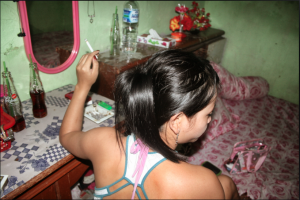1. Halal & Haram: What do they mean?
“Halal” originates from the Arabic phrase that means “allowed” or “permitted” by Islamic Law.
“Haram” on the other hand means “forbidden” or “prohibited” in Arabic.
Islamic Law (Hukum Syarak) refers to the laws that are set down by:
The Quran: The word of Allah
The Sunnah: Prophet Muhammad’s sayings and accounts of his conduct, as an example to Muslims on how they should live by the Quran.
These 2 sources provide the basic concepts and examples that form the core of Muslim life. From this, scholars of Islamic Law have then further interpreted and applied these principles in various situations to help Muslims live the Islamic way.
2. Why do we need these terms?
The point of Halal and Haram is to help Muslims differentiate between good and bad.
Allah will not make something halal except that it is good, and Allah will not make it haram except that it is bad.
Halal and Haram is a concept that encompasses every aspect of a Muslim’s life, and food is just one of them.
It should also apply to a Muslim’s livelihood, human relations, actions and manners, etc. This is so that a Muslim may lead a clean and healthy life with the highest standard of good conduct, which is the aspiration of the Muslim way of life.
3. So halal and haram are not just labels meant for food?
No they don’t just apply to food. But because food is such a basic aspect of life, it will inevitably dominate concerns about what’s halal and haram.
4. Okay, so who determines what’s halal or haram and how?
Only Allah can determine what is halal or haram, and these are stated in the Quran or exemplified by the Sunnah.
Anything deemed halal or haram today is really just a restatement – based on ostensibly learned interpretation – of what Allah determined. The verdict must be certain to the point where it cannot be overruled by doubt.
5. So what is JAKIM’s role in this?
In Malaysia, the matter of halal/haram is usually focused on food and consumer goods.
This is enforced through the Trade Descriptions Act 2011, Trade Descriptions (Definition of Halal) Order 2011, and the Trade Descriptions (Certification and Marking of Halal) Order 2011 under the Ministry of Domestic Trade, Cooperatives and Consumerism.
6. How does JAKIM verify the halalness of goods and services?
JAKIM will check, among other things:
1) That the ingredients used for the food/item has a recognised halal certificate
2) The process flowchart for every product
3) For slaughterhouses, that they have a letter of accreditation for permanent slaughterer from the State Islamic Religious Department
4) That the applicant has an Internal Halal Committee to monitor the enforcement of halal systems in the area
JAKIM will audit the premises in the process of halal certification. It is a strict process where all aspects of production are examined, and must pass without questionable doubt in the following:
1) Preparation
2) Slaughtering
3) Processing
4) Handling
5) Storage
6) Transportation
7) Cleaning
8) Disinfection
9) Management processes
Once the certification has been given, JAKIM will then periodically monitor the certificate holders at least once a year. High-risk certificate holders (ie for meat-based products, slaughterhouses, oils & fats) may be inspected more than once a year.
JAKIM may also run lab tests if necessary.
6. So what exactly is Halal/Haram in terms of food & consumer goods in Malaysia?
According to the Trade Descriptions (Definition of Halal) Order 2011:
Halal food (and services relating to it):
1) Is not made from or contains any part of animals that are prohibited by Islamic Law
2) Does not contain any impurities as defined by Islamic Law
3) Is not blood
4) Does not intoxicate, or causes one to lose their rationality or control over their behaviour
5) Does not contain any human parts or by-products
6) Is not poisonous or harmful for health
7) Is not prepared, processed or manufactured using any equipment that has been contaminated by impurities 8) Did not, in its preparation, processing or storage, come into contact, mixed or was near any food items which failed to fulfil (1) and (2).
Halal consumer goods (and the services relating to them) are:
1) Cosmetics made from plants or sourced from animals that have been slaughtered in a halal manner
2) Clothing and equipment made from plants or leather that was cleansed in an Islamic way (“samak”), except for pig and dog sources.
3) Clothing and equipment made from bones, horns, nails or teeth of animals that are permissible to be eaten through Islamic slaughtering
Animals that are haram to be eaten are:
1) Permissible animals that were not properly slaughtered in an Islamic way (which includes carcasses)
2) Pigs
3) Dogs
4) Animals with fangs/tusks/claws/sharp beaks which are used to kill
5) Animals which Islam encourages to kill, such as rats, scorpions, crows, centipedes snakes and the like
6) Animals that Islam forbids to be killed, such as ants, bees, woodpeckers, hoopoe birds and spiders
7) Animals that are generally looked upon with disgust, such as lice, flies, maggots and the like
8) Animals that live on both land and water, such as frogs, crocodiles, turtles, seals and the like
9) Animals that are poisonous, intoxicating or harmful for health
7. What if something haram was eaten accidentally?
Islam is a forgiving religion that is compassionate towards human errors.
If the mistake was done unintentionally, out of forgetfulness, lack of knowledge or information, or out of necessity, then this person will be forgiven. He or she must however immediately repent for his mistakes and resolve not to repeat it again. See 6:54 and 2:286 in the Quran as examples.
8. What should you do then, if you consumed Haram things? Does it really call for drastic measures?
If you accidentally ate something that is not halal, there are no requirements for special cleansing, aside from perhaps rinsing your mouth to clear out any remaining bits of the non-halal food.
This is true even for pork. No stomach-cleaning nor blood transfusions are needed.
9. So, how do we understand JAKIM’s decision on the Cadbury pig-DNA issue?
In the Cadbury pig-DNA issue, the National Fatwa Council has reaffirmed that the Cadbury chocolate products are still halal, despite the 2 samples found by the Ministry of Health to contain traces of pig-DNA.
The National Fatwa Council has deemed this to be “Umm al-Balwa”, or a situation of distress that is difficult to avoid.
Based on the explanations above, Cadbury would have needed to pass an end-to-end examination of its manufacturing process and continued monitoring by JAKIM in order to maintain its halal certification thus far.
Given the extent of JAKIM’s procedures, it is safe to assume that all reasonable measures have been made to ensure that the products are halal.
If there is a risk of contamination outside this process, then it would be very difficult to avoid and detect. In line with the principles of Islamic law mentioned above, the halal status can only be removed if it can be proven that the general state of the Cadbury products is haram.
Provided that all reasonable measures are being made to reduce this risk, then Muslims should refer to the existing halal status and have peace of mind. After all, certainty cannot be overruled by doubt.
10. Wow. So many procedures and lists! Islam sounds so….complicated….and rigid. Is this true?
No. Halal and Haram should be a principle of life to distinguish between good and bad, rather than a list of do’s and don’ts.
By and large the agreement is that nothing should be deemed haram, except when there is a Quranic passage or Sunnah that says so. Where answers are not immediately straightforward, learned interpretation will be called for.
This basically means that Muslims are free to live their lives aside from the few things that have been specifically forbidden in the Quran or Sunnah.
Even so, with regards to prohibited (“haram”) matters and compulsory duties, Islam always provides for leniency during exceptional or difficult situations.
Thus is it clear that the intention of Islamic Law is to bring good, and not hardship. Please do not confuse the behaviour of a few Muslims for the religion as a whole 🙂
This is part of our #Projek101 series, where we breakdown otherwise complicated concepts to their fundamentals, in particular to an audience with no familiarity with Islam. Any questions or suggestions? Feel free to email us at projekdialog@yahoo.com!




